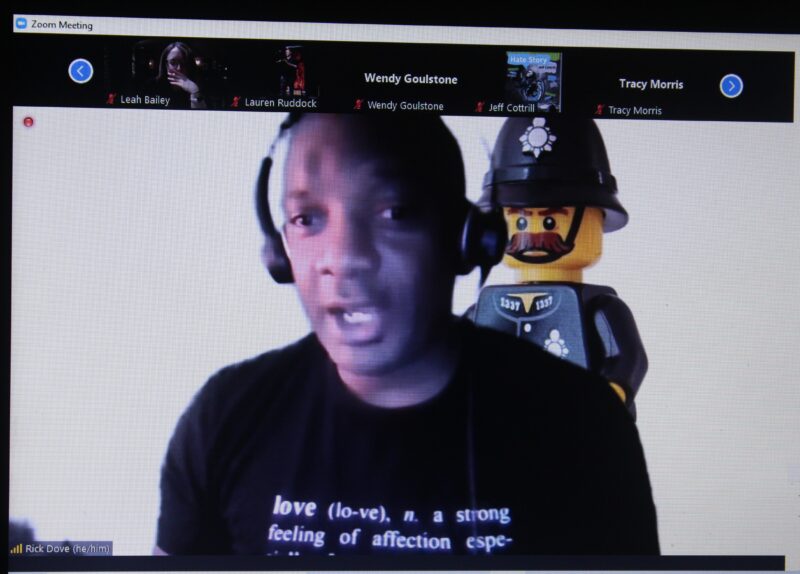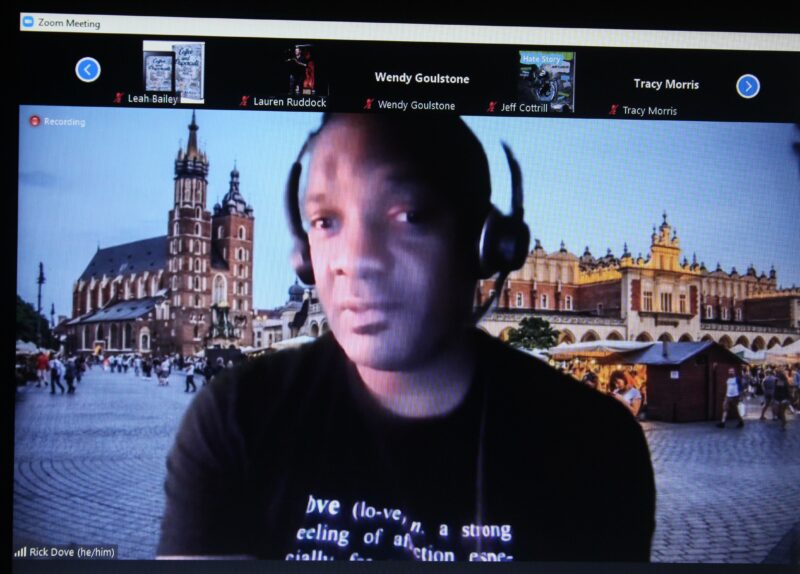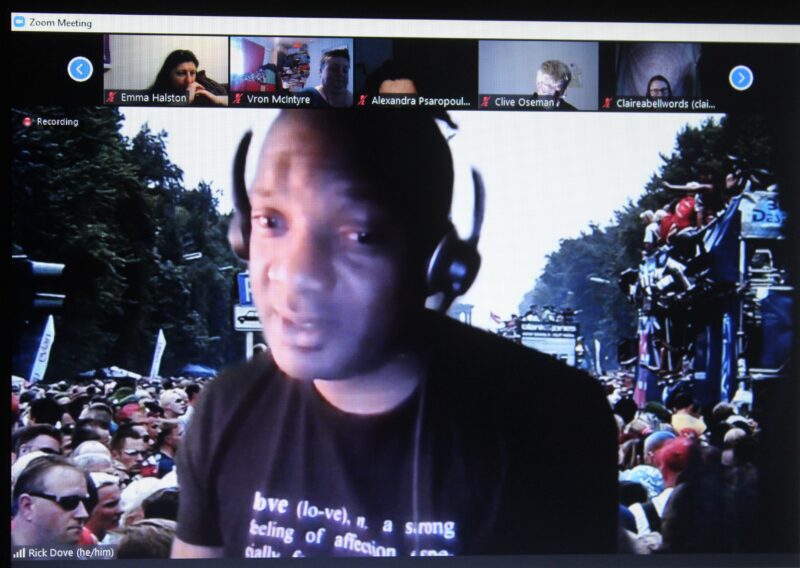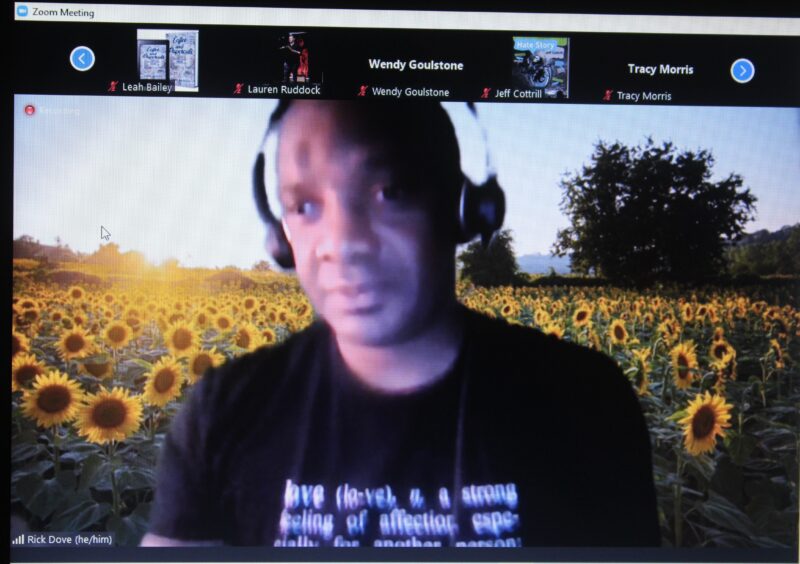INTERVIEW: FIRE & DUST MEETS RICK DOVE
Rick Dove is a queer, mixed-race, and neurodivergent poet and storyteller from London. His work explores themes of identity, philosophy and social justice using a blend of traditional, modern and free verse styles in order to interrogate the liminal spaces that define our common humanity. Notable performances include runs at Wandsworth Arts and Edinburgh Fringe Festivals, Black History Month with the Cabinet Office, and regular sets with Sofar Sounds. Rick was crowned the Hammer&Tongue National Poetry Slam Champion at the Royal Albert Hall in 2021. Rick’s words have featured in various publications, including The Guardian, Nymphs & Thugs, Apples & Snakes, Arachne Press, Nine Pens Press, and The Morning Star. His debut full collection, Tales From the Other Box, was published in August 2020 by Burning Eye Books. T.S. Eliot Prize winner Roger Robinson has dubbed him “one to watch”.
On 9th June 2022, Rick was the guest headliner at our virtual Fire & Dust poetry night. His set went down well with the audience, and we caught up with him after the event to ask a few questions…
HCE: Tell us a little about your background and journey as a writer so far. What inspired you to start creating and performing poetry?
RD: I wrote poetry and short stories all the way through high school and university, where I was undergraduate co-ordinator for the Arts Committee, but stopped writing (or at least slowed down) once I graduated. Life got in the way a bit. I only revisited poetry after a family bereavement, as a way to process grief and survivor guilt. I posted a few pieces online, someone suggested I attend a local poetry night, I went, loved it, and the rest as they say…
HCE: Who is your work aimed at – do you have an ideal audience in mind when you’re putting a poem together?
RD: I don’t really have an audience in mind until a piece begins to take shape. In the way I write, I am often led to the meaning and the language I am using by the poem itself. Once I get close to the finish of the first draft and I can see where it is going, then I might hone or refine it for a particular audience.

HCE: How did it feel to win the H&T National Poetry Slam last year?
RD: Winning the national title in 2021 was surreal, even a year later I still have that “did that really happen?” moment regularly. I didn’t go into poetry with any ambitions, I just love the artform; whether reading, watching, writing, or performing, it really is my happy place. And I get to enjoy doing all of that with some of the best people you could ask for. So, to win a title, any title, was genuinely more than I dreamed possible. I do dream a little bigger these days, but not too much.
HCE: Do you enjoy competing in slam events? What are the big differences for you, when it comes to choosing poems to perform for a slam vs. poems for a headline set?
RD: Slam is a specific artform. I have often heard people talk about the difference between show and tell, that page poems are more show, and stage poems are more tell, and that is because performed work has to land and resonate on the first pass (no re-reading a poem in the slam to get subtle points to land). I don’t entirely agree with that idea, because I think show and tell can be interchanged and interwoven in both spaces, and I really think that the audience will follow you on the most twisty and tricksy journeys if you pitch it right. The great challenge of slam is to get all of that together in a 3 min package, so yeah, specific artform. When you put together a set of say 20mins, you have far more space to breathe, to segue, and to expand on the story, and that means the goal is to construct something maybe greater than the sum of its parts.
HCE: What do you feel most well-written poems have in common?
RD: I think the best poems, whether page or stage (or a hybrid), are those which form follows meaning follows senses. By that I mean the form, whether that is a classic form like a sonnet or villanelle, merely something metered or even a golden shovel, should add to the meaning of the poem. The question “why is it laid out that way?” should have an answer. And this should both feed into the sensory aspect of the piece and enrich it further, so the sound of the words, the senses they evoke. I think the very best poems combine these elements so that you feel the work couldn’t exist any other way. It is alchemy. The best poets are alchemists.

HCE: Several of the poems you performed at Fire&Dust, as well as your Zoom backgrounds, touched on your love for certain European cities. Has life as a poet brought you many travel experiences, or is that something you’ve done outside of writing?
RD: I did the vast majority of my travelling in my day job away from writing, in the fallow years between graduating university and starting writing again. I saw so much of the world running events, and love the idea that as the writing thing takes off, I might get to do that all again as a panellist or speaker, as opposed to the team dealing with the logistics and risk assessments…
HCE: Some of your poetry deals with your own life experiences in a raw and honest way. Is this an emotionally draining thing to do? What is the top piece of advice you would give other poets for tackling heavy/personal topics in their writing?
RD: My top piece of advice is to protect yourself with abstraction. Even in the pieces that seem really personal, I ensure that there is a fictionalised/abstracted element to the work (even beyond any wider metaphor), so that I am not exposing all the raw at once. A poem is not a sworn testimony, or a deathbed confession, so feel free to leave out gorier details, to change details, move locations, etc. The essence is what you are after. You can protect yourself that way. If you are too straightforward performing from that place too much, it will drain you. Work out your minimum safe distance to a subject and stick to it.
HCE: You mentioned during your F&D performance that you have anisocoria – does this condition cause any difficulties for you as a writer and performer?
RD: I have a few medical conditions, neurological and ocular, which do require some consideration with regards my practice. Like I *have* to take breaks when typing on a computer screen. I have to protect my voice if I have a longer set to perform. I mustn’t forget to take my meds, etc. But technology is good and the people in the poetry scene are generally very accommodating, so I haven’t really struggled, even with immunosuppressive medications. And actually having to compensate so much has been a real help to me in terms of composition and performance – you get used to meeting people halfway in understanding and that skill is transferable to poetry.
HCE: What type of poetry do you seek out for personal enjoyment? As a reader/listener, when you engage with a poet’s work, what are you hoping to get out of it?
RD: I tend not to seek out many poems or poets as I find that the right poems, poets, and their collections for me, tend to seek me out via recommendation. Last summer, I was switched on to Frank O’Hara by a friend and I love Danez Smith (Homie is a magnificent collection), they were a recommendation that came from a number of directions all at once a little while ago. I am loving Cynthia Miller’s Honorifics at the moment and C+nto by Joelle Taylor is so deserving of all its plaudits. I would probably say the best way to see “what is what”, is just to follow poets on social media. We will often get really over-excited by someone we have just read and post screenshots. I find most of my favourite poems that way.

HCE: It was clear from your Fire & Dust feature that you’re an experienced and compelling performer. You come across as very confident…but do you get nervous? Any tips for how to keep calm on the mic and command a room’s attention?
RD: My mum used to say “show me a chef who has never cut themselves, and I will show you an amateur”. It is something that stuck with me. Some skills, like knife skills, can only be learned by experience and practice. I still get nervous, but I can damp them down because I have done it before, made mistakes before, and have worked out how to cope, how to ad lib, how to recover. That can all seem daunting when you are starting out, but the hard yards at the beginning are vital for confidence. As is practice. Rehearsal is always good. Even if reading from a page, knowing the poem will free you to perform it.
HCE: In your opinion, what more should arts communities be doing to support poets of colour, queer poets and neurodivergent poets, to make sure their voices are platformed and heard?
RD: I think that platforming diverse voices is the important thing. I think my time away from poetry owed a lot to the fact that a literature career didn’t appear to be viable for people like me (at so many of my intersections of identity). A lot of gatekeeping and elitism kept me at arms’ length. The wonderful thing about the world and its general direction of travel, albeit glacial, is that we are starting to understand the importance of visible role models, of accessibility, and of safe spaces, and all that does with regards to aspiration and inspiring new artists and marginalised voices. There are so many people who could be poets but poetry just never made them feel welcome. That is changing, finally. Adrian Mitchell, wasn’t it, who said “Most people ignore most poetry because most poetry ignores most people”. Well, not anymore. Right? Right.
HCE: What’s next on the horizon for you? Are you already working on projects/booked for upcoming performances?
RD: At the moment I am working on a scratch show and commission for the Raze Collective which will be showcasing in July and, beyond that, pulling together poems on a variety of subjects for larger projects, as well as developing a series of online writing workshops, which have an emphasis on process. I am not performing much over the summer as I have an admin role with the PBH Free Fringe in Edinburgh, but will start on stage again from September onwards. I have a few dates in the diary, but more wouldn’t hurt… *winks*

HCE: What’s the best way for people to keep connected with you and your work, or contact you for bookings?
Rick’s book Tales from the Other Box is available online direct from publisher Burning Eye Books as well as other bookshops and retailers.
